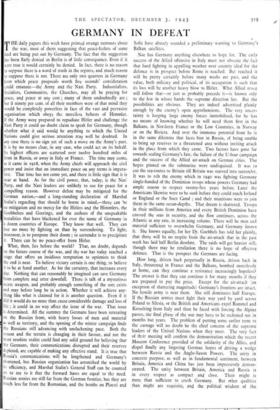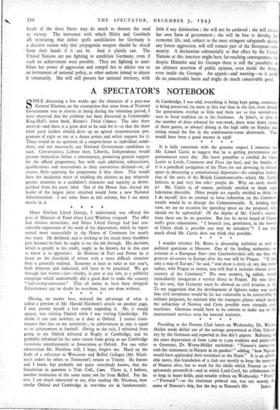GERMANY IN DEFEAT
THE daily papers this week have printed strange rumours about the war, most of them suggesting that peace-feelers of some kind are being put out by-Germafty. The fact that the suggestion has been flatly denied in Berlin is of little consequence. Even if it were true it would certainly be denied. In fact, there is no reason to suppose there is a word of truth in the reports, and much reason to suppose there is not. There are only two quarters in Germany from which peace proposals worth five seconds' consideration could emanate—the Army and the Nazi Party. Industrialists, Socialists, Communists, the Churches, may all be praying for peace, and peace at any cost ; many of them undoubtedly are ; but if ninety per cent. of all their members were of that mind they would be completely powerless in face of the vast and pervasive organisation which obeys the merciless behests of Himmler. If the Army were prepared to repudiate Hitler and challenge the Nazi Party it could no doubt claim to speak for Germany, though whether what it said would be anything to which the United Nations could give serious attention may well be doubted. In any case there is no sign yet of such a move on the Army's part. It is by no means clear, in any case, who could act on its behalf. Its highest officers are scattered over twelve hundred miles of front in Russia, or away in Italy or France. The time may come, as it came in 1918, when the Army chiefs will approach the civil power and insist that an immediate peace on any terms is impera- tive. That time has not come yet, and there is little sign that it is near at hand. As for the civil power, that, today, is the Naz Party, and the Nazi leaders are unlikely to sue for peace for a compelling reason. However defeat may be mitigated for the German nation,—and a long-standing declaration of Marshal Stalin's regarding that should be borne in mind,—there can be no mitigation and no mercy for the Hitlers and the Himmlers, the Goebbelses and Goerings, and the authors of the unspeakable brutalities that have blackened for ever the name of Germany in a dozen countries of Europe. They know that well. They can lose no more by fighting on than by surrendering. To fight, moreover, is to postpone their doom ; to surrender is to precipitate it. There can be no peace-offer from Hitler.
What, then, lies before the world? That, no doubt, depends on the future course of the war, and the war has today reached a stage that offers an insidious temptation to optimists to think the end is near. To believe victory certain is one thing, to believe it to be at hand another. As for the certainty, that increases every day. Nothing that can reasonably be imagined can save Germany from complete and utter downfall. There is talk of a mysterious secret weapon, and probably enough something of the sort exists and may before long be in action. Whether it will achieve any- thing like what is claimed for it is another question. Even if it did it would do no more than cause considerable damage and loss of life ; it could in no way affect the issue of the war. That issue is determined. All the summer the Germans have been retreating on the Russian front, with heavy losses of men and material as well as territory, and the opening of the winter campaign finds the Russians still advancing with unslackening pace. Both the season and the terrain is changing in their favour, and not the most resolute realist could find any solid ground for believing that the Germans, their communications disrupted and their reserves depleted, are capable of making any effective stand. It is true that Russia's communications will be lengthened and Germany's shortened, but. Russian organisation has astonished the world by its efficiency, and Marshal Stalin's General Staff can be counted on to see to it that the forward bases are equal to the need. Russian armies are still far from the German frontier, but they are much less far from the Rumanian, and the bombs on Ploesti and Sofia have already sounded a preliminary warning to Germany's Balkan satellites.
Nor has Germany anything elsewhere to hope for. The early success of the Allied offensive in Italy must not obscure the fact that hard fighting in appalling weather over country ideal for the defence is in prospect before Rome is reached. But reached it will be pretty certainly before many weeks are past, and the value, both military and political, of its occupation is such that its loss will be another heavy blow to Hitler. What Allied move will follow that—or just as probably precede it—is known only to the few in whose hands the supreme direction lies. But the possibilities are obvious. They are indeed advertised plainly enough by the enemy's open apprehensions. The very uncer- tainty is keeping large enemy forces immobilised, for he has no means of knowing whether he will need them first in the Balkans, in Northern France or the Low Countries, in Norway or on the Riviera. And over the immense potential front he is in the same dilemma that faces him in Russia, of being unable to bring up reserves to a threatened area without inviting attack in the place from which they came. Two factors have gone far towards sealing Germany's fate, the failure of the U-boat campaign and the success of the Allied air-attack on German cities. The hopes pinned on the submarine were undisguised. It was to cut the sea-routes to Britain till Britain was starved into surrender. It was to rob the enemy which in 1940 was fighting Germany single-handed of the Dominion troops whose powers Germany had ample reason to respect twenty-five years before. Later the Americans likewise were to be sunk before they could reach Ireland or England or the Suez Canal ; and their munitions were to join them in the same ocean-depths. That dream is shattered. Troops in their millions from America and every British Dominion have crossed the seas in security, and the flow continues, across the Atlantic at any rate, in increasing volume. There will be men and material sufficient to overwhelm Germany, and Germany knows it. She knows equally, for her Dr. Goebbels has told her plainly, that there will be no respite from the air-attack that in the past week has laid half Berlin desolate. The raids will get heavier still, though there may be retaliation there is no hope of effective defence. That is the prospect the Germans are facing.
How long, driven back perpetually in Russia, driven back in Italy, threatened in France and the Balkans, bombed mercilessly at home, can they continue a resistance increasingly hopeless? The answer is that they can. continue it for many months if they are prepared to pay the price. Except for the air-attack (an exception of shattering magnitude) Germany's frontiers are intact. No hostile army is near them. She still dominates half Europe. If the Russian armies must fight their way yard by yard across Poland to Silesia, or the British and Americans expel Rommel and Kesselring from Italy and then be faced with forcing the Alpine passes, the final phase of the war may have to be reckoned not in months but years. The problem of putting some earlier term to the carnage will no doubt be the chief concern of the supreme leaders of the United Nations when they meet. The very fact of their meeting will confirm the demonstration which the recent Moscow Conference provided of the solidarity of the Allies, and dispel finally any lingering German hopes of driving a wedge between Russia and the Anglo-Saxon Powers. The unity in concrete purpose, as well as in fundamental sentiment, between Britain, America and China has just been impressively demon- strated. The unity between Britain, America and Russia is in every respect as compact and close. Their might is more than sufficient to crush Germany. But other qualities than might are requisite, and the political wisdom of the heads of the three States may. do much to shorten the road to victory. The insistence with which Hitler and Goebbels ate reiterating that defeat spells annihilation for Germany is a decisive reason why that propaganda weapon should be struck • from their hands if it can be. And it plainly can. The United Nations are not fighting to annihilate Germany, even if such an achievement were possible. They are fighting to anni- hilate her power of aggression and compel her to abjure war as an instrument of national policy, as other nations intend to abjure it voluntarily. She will still possess her national territory, with little if any diminution ; she will not be enslaved ; she will choose her own form of government ; she will be free to develop her economic life, and, subject to the most stringent safeguards against any future aggression, will still remain part of the European com- munity. A declaration substantially to that effect by the United Nations at this juncture might have far-reaching consequences, for despite Himmler and his Gestapo there is still the possibility of an ultimate assertion of public opinion, even inside the Army, even inside the Gestapo. An appeal—and warning—to it could do nosconceivable harm and might do much conceivable good.



























 Previous page
Previous page